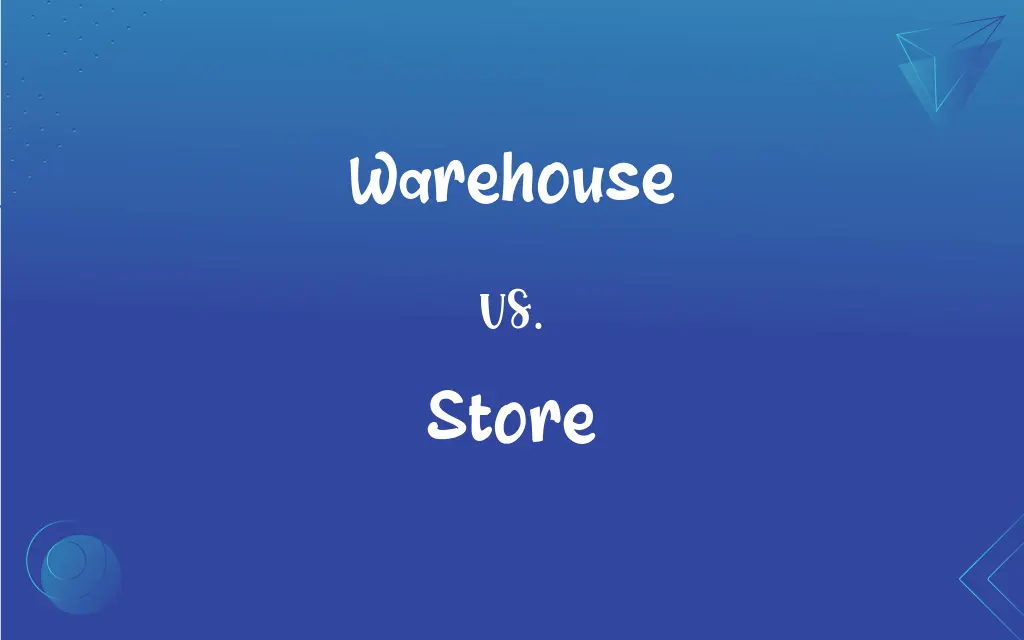Warehouse vs. Store: What's the Difference?
Edited by Janet White || By Harlon Moss || Updated on June 12, 2024
A warehouse is a large space for storing goods, while a store is a retail space for selling goods to consumers.

Key Differences
A warehouse serves as a storage hub for goods before they are distributed for sale. It is a commercial building that manufacturers, exporters, wholesalers, and businesses use to store their products in bulk. Warehouses are typically not open to the public and are designed to handle large quantities of goods, often in crates or on pallets. A store, on the other hand, is a place where goods are displayed and sold to the public. It is a retail environment where products are organized for easy browsing and purchase by consumers.
While a warehouse is focused on the storage and possibly sorting and packing of goods, a store is tailored towards the customer experience. Warehouses are generally located in industrial areas due to their size and logistical needs, facilitating easy access for trucks and freight. Stores are located in more accessible areas where consumers frequent, like shopping malls, high streets, or commercial centers. The design of a warehouse is utilitarian, prioritizing space optimization, while a store is designed with aesthetics in mind to attract and retain customers.
In terms of operations, a warehouse is characterized by activities such as inventory management, order fulfillment, and possibly manufacturing. The primary function of a warehouse is to ensure that goods are kept securely and in good condition until they are needed. Stores focus on sales, customer service, and the retail experience. Employees in a warehouse may operate heavy machinery to move stock, whereas store employees engage in customer interactions, sales processing, and merchandising.
Warehouses and stores also differ in their roles within the supply chain. The warehouse acts as a node in the supply chain, receiving, holding, and then distributing goods to various destinations, including stores. A store is the end point of the supply chain where the goods reach the consumer. The operational tempo of a warehouse is consistent with the supply chain demands, while a store's activity fluctuates based on consumer shopping patterns and seasons.
The technologies used in warehouses and stores also differ. Warehouses may use sophisticated inventory management systems, automated retrieval systems, and robotics to handle goods efficiently. Stores use point-of-sale systems, customer relationship management software, and various payment processing technologies to facilitate retail transactions. While both are essential for the commerce ecosystem, their functions and operations are distinctly different.
ADVERTISEMENT
Comparison Chart
Primary Function
Storage of goods
Sale of goods
Location
Industrial areas for logistical efficiency
Commercial areas for customer accessibility
Access
Not typically open to the public
Open to the public for shopping
Design
Utilitarian, focused on storage efficiency
Aesthetically pleasing, focused on shopping experience
Operations
Inventory management, distribution
Customer service, sales, merchandising
ADVERTISEMENT
Warehouse and Store Definitions
Warehouse
Distribution Center.
Goods are shipped to regional stores from the central warehouse.
Store
Sales Venue.
The store offered a discount on all electronic items.
Warehouse
Storage Facility.
The company rented a warehouse to store excess inventory.
Store
Retail Outlet.
She bought the dress at her favorite store downtown.
Warehouse
Industrial Building.
The new warehouse features state-of-the-art inventory systems.
Store
Merchant Establishment.
The store stays open late during the holiday season.
Warehouse
Bulk Storage.
The warehouse can hold thousands of pallets at one time.
Store
Shopping Location.
They found the perfect gift at a specialty store.
Warehouse
Commercial Space.
They converted the old warehouse into a furniture showroom.
Store
Place of Business.
The new store will open next month in the mall.
Warehouse
A place in which goods or merchandise are stored; a storehouse.
Store
A place where merchandise is offered for sale; a shop.
Warehouse
A large, usually wholesale shop.
Store
A stock or supply reserved for future use
A squirrel's store of acorns.
FAQs
Is a store always smaller than a warehouse?
Generally yes, but size can vary.
What activities happen in a store?
Selling goods, customer service, and merchandising.
Do warehouses need to be in specific locations?
Yes, usually in industrial zones for logistics reasons.
What is a warehouse used for?
Storage and distribution of goods.
Can consumers shop in a warehouse?
Typically no, unless it's a warehouse store.
What's a warehouse club?
A membership-based retail store with warehouse-style storage.
Do warehouses sell goods?
Not usually to the public; they're for storage and distribution.
Can a store have a warehouse?
Yes, many large stores have attached or separate warehouses.
Do all warehouses look the same?
No, they vary based on industry and function.
Are warehouses part of the retail process?
Indirectly, as they store goods before they reach retail.
How do stores get their products?
Often from warehouses where goods are stored.
Do stores handle bulk goods like warehouses?
Not typically; stores deal with smaller quantities.
Are there different types of stores?
Yes, including department, specialty, and convenience stores.
What kind of technology is used in warehouses?
Inventory management and material handling systems.
Is online shopping a form of store?
Yes, it's a virtual store.
What is the difference between a warehouse and a distribution center?
Distribution centers are more focused on order processing and shipping.
Are store employees the same as warehouse employees?
No, they have different roles and skill sets.
Do stores require as much space as warehouses?
Not generally, since they don't store large quantities of goods.
Can a store function without a warehouse?
Yes, but a warehouse enhances a store's operations.
Is it common for a warehouse to be open 24/7?
Yes, especially if it serves a busy supply chain.
About Author
Written by
Harlon MossHarlon is a seasoned quality moderator and accomplished content writer for Difference Wiki. An alumnus of the prestigious University of California, he earned his degree in Computer Science. Leveraging his academic background, Harlon brings a meticulous and informed perspective to his work, ensuring content accuracy and excellence.
Edited by
Janet WhiteJanet White has been an esteemed writer and blogger for Difference Wiki. Holding a Master's degree in Science and Medical Journalism from the prestigious Boston University, she has consistently demonstrated her expertise and passion for her field. When she's not immersed in her work, Janet relishes her time exercising, delving into a good book, and cherishing moments with friends and family.
































































